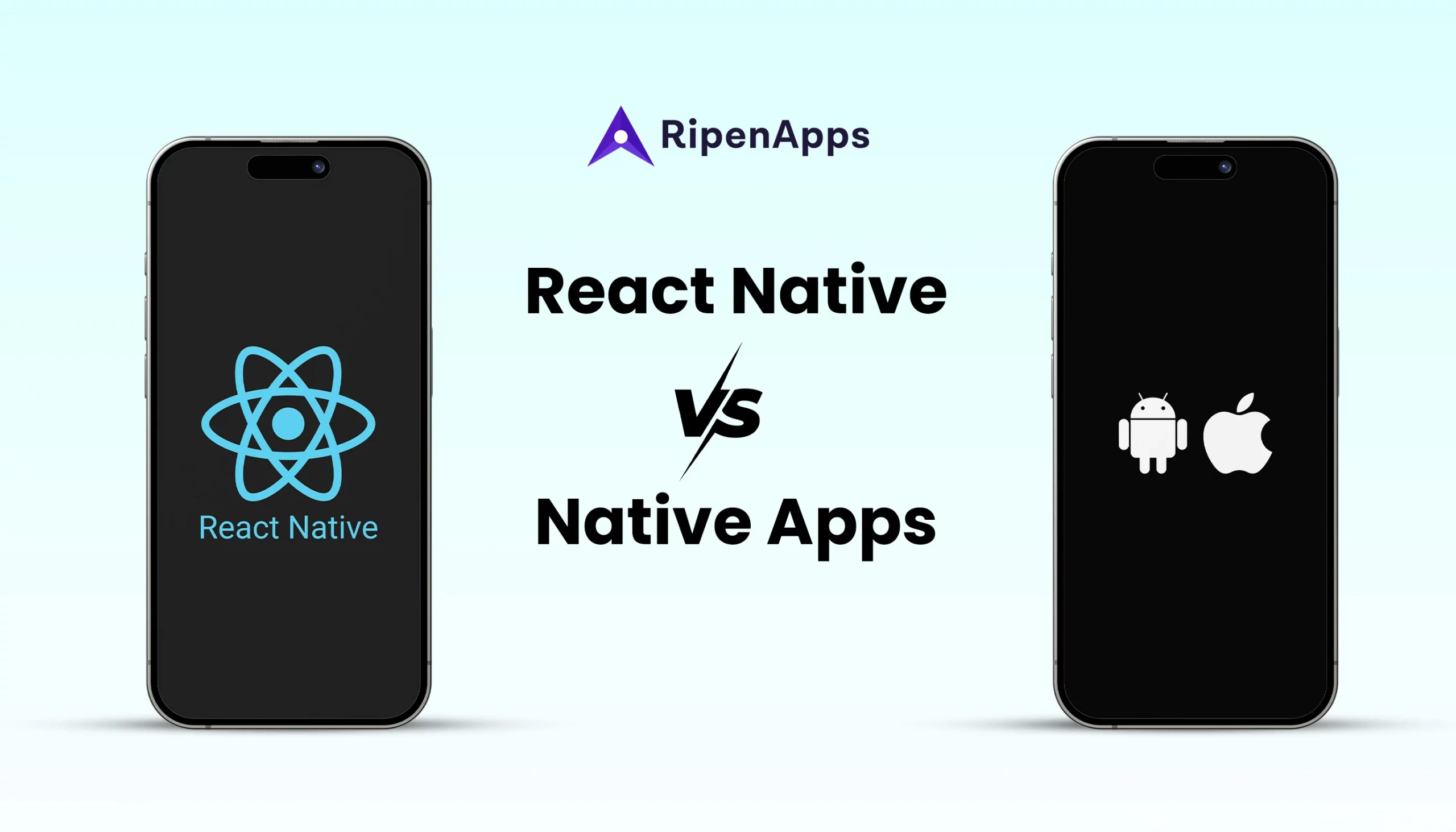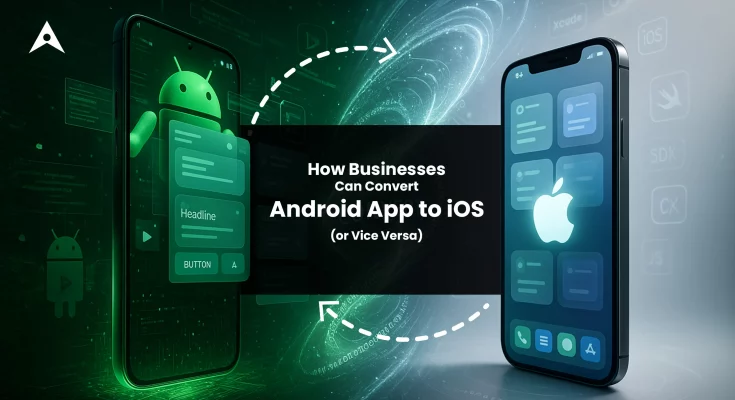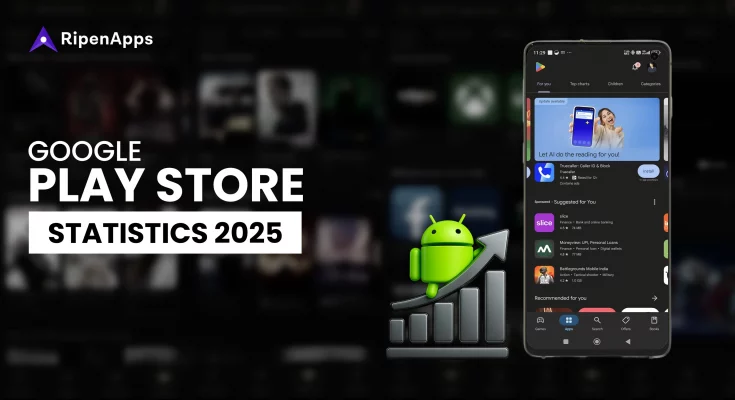Suppose you’re a business owner with a groundbreaking app idea. You need a high-performing, scalable, and cost-saving solution to realize your vision. But you are stuck at one of the biggest debates in the industry: React Native vs Native apps. Which one offers the best performance, scalability, and cost-effectiveness?
On one side, Native apps provide fast performance, deep integration with device features, and a seamless user experience. However, they are costly due to longer development cycles, higher expenses, and the maintenance of separate codebases for iOS and Android. On the other hand, React Native provides speed, cross-platform compatibility, and efficiency, but it can also face performance issues and complex UI customization.
So, which one is the right choice? Should you invest in a native app for blazing-fast performance, or will React Native be able to future-proof your business with flexibility and scalability? This blog dives deep into this debate.
In this blog, we’ll provide a thorough comparison of native vs React Native apps, focusing on significant factors. By the end of this blog, you will have in-depth knowledge about both, helping you decide which one is best for your business in 2025.
Table of Contents
What is Native Application?
A native app is developed to be used on a particular platform or device. These applications are built for use on a particular OS, which makes them capable of using device-specific hardware and software. A native app can provide better performance and take advantage of the latest technology, such as artificial intelligence and augmented reality. Native apps are built separately for both iOS and Android platforms.
What is A React Native Application?
React Native is a popular cross-platform app development framework that is used to build applications for both iOS and Android platforms using JavaScript. This framework uses native components to render a user interface. One of the benefits of React Native is that it gives the same native look and feel while still providing extra portability and a familiar technology.
Talking about its history, it was built by Facebook (now Meta) to provide a smooth and easy cross-platform mobile development. Businesses choose react native for mobile app development because it uses JavaScript as the primary language, which is easy to learn and use.
React Native Vs Native Apps: Head-To-Head Comparison
After understanding React Native and native apps, it’s time to jump into our main topic and explore the debate: React Native vs native apps. These applications have provided the best results to businesses across industries and helped them achieve success. Let’s explore a thorough comparison between React Native vs native apps:
1. Development Time
The most significant factor to choose from React Native vs native apps is the development time. In native app development, the code is written individually for both Android and iOS platforms due to technical variations. You need to assign two different teams for iOS and Android respectively. Alongside, you need to make & run the project after making a change. This can result in extra development time due to some extra efforts.
On the other hand, React Native works on a single codebase, which means you can build apps for Android and iOS using the same codes. Hot reloading makes it easier to deploy the project without rebuilding it every time, cutting down the effort and time. Top React Native app development companies promise to build mobile apps before the deadline.
So, it’s clear that React Native helps you build applications earlier than native, winning the react native vs native app development debate in this factor.
2. Mobile App Development Cost
Building a native app costs more because you need to build separate codebases for iOS and Android. It also increases the development time, maintenance efforts, and the need for specialized developers for each platform. On the other hand, React native app development cost is 30-35% less than native app development. So, react native wins the native vs react native development debate in cost.
3. Performance
Another factor that you should consider in the react native vs native development comparison is performance. React Native uses JavaScript, which works with a single device thread. This framework can’t perform multiple tasks at the same time. React Native does not support trending modules and functionalities. So, React Native is incompatible to embrace native device features.
Native apps are developed using Swift, Java, or Kotlin which are better than JavaScript. These languages can work on emerging features, make heavy calculations and integrate hardware devices. It allows developers to use any type of app using native technologies.
Overall, native wins the performance battle in the native app vs react native app development.
4. Long-Term Scope
Businesses look for a long-term scope when deciding to build a mobile app. It helps them stay relevant and future-ready. So, let’s explore which one provides a long-term scope in this react native vs native apps development debate.
Native apps are supported by Google and Apple, which help them easily get the tools to implement any functionality, resolve errors, and update the app without impacting the usability. On the other hand, React Native does not provide updates in sync with Apple and Google. Alongside, there’s no surety about how long the support continues for this framework.
So, it will be an ideal decision if you choose native apps over React Native while considering the long-term scope in mind.
5. API and Third-Party Support
Native app development frameworks have the ability of using all types of APIs directly, but the same is not possible with React Native. The cross-platform framework is capable of using only a few APIs into their development processes. Even react native requires a layer of native technologies to build a connection layer and implement APIs. It shows that native app development wins the battle over react native when it comes to APIs.
6. UI/UX Experience
UI/UX experience is another significant factor in the native vs react native apps debate. However, one of the top cross-platform app development frameworks, react native, allows developers to reuse the functionality code and write platform-specific code separately. It’s a challenge to create a complex UI such as custom views, navigation patterns, seamless transitions, and animations in react native app development. Also, react native can’t face the standards of Android and iOS.
On the other hand, native development allows designers to work individually on each and every screen for both Android and iOS devices, resulting in higher mobile app UI/UX experience. So, native apps emerge winners in the react native vs native apps debate about mobile app experience.
Read Also: Top React Native UI Libraries to Build Intuitive Mobile Apps with Ease
7. App Security
React Native is based on JavaScript, which is not a strongly typed and OOP-based language like native app development languages such as Java, Kotlin, Objective-C, and Swift. However, React Native databases can be used to improve security, but it still faces difficulty in identifying errors and loopholes in the development process.
But that’s not the case with native app development; it provides wonderful app security and secures the application from normal attacks. So, native is the winner of the react native vs native mobile app development debate if we consider security.
8. App Maintenance
Talking about app maintenance in the react native vs native apps debate, it’s a tedious and time-consuming task for native app development. Paying attention to bugs on both native platforms and resolving them separately can take a lot of time. But using react native for mobile app development can help you resolve bugs easily on both platforms. That’s why partnering with a top react native development company comes with post-launch support.
We have discussed the top factors that are necessary while deciding the best from react native vs native app development. Now, let’s summarize these things and understand the comparison in a tabular format. The table can help you understand the different easily. Take a look at the table below:
| Factor | React Native | Native Apps |
| Development Time | Faster speed due to the single codebase that works on both Android and iOS. | Slower speed due to separate codebase for both platforms. |
| App Development Cost | Less (builds app for both platforms using a single codebase) | Writing code separately for both platforms can be money-consuming |
| Performance | Near-native, but still some performance issues | Smooth performance |
| Long-Term Scope | Provides long-term scope due to support by Apple and Google | No surity about how long the support continues |
| API and Third-Party Support | Faces issues but strong community | Uses APIs directly and has a strong community |
| UI/UX Experience | Faces challenge in designing complex UI | Provides a higher mobile app experience |
| App Security | Not that much | Strong security |
| App Maintenance | Enables maintenance with minimal cost and money | Enable maintenance with extra time and money |
| Best For | Startups, MVPs, cost-effective solutions, and apps with simple-to-medium complexity | High-performance apps, gaming, fintech, healthcare, and enterprise apps |
React Native Vs Native Apps: Which One Should You Choose?
We have provided you with a detailed comparison to help you choose the best. It’s important to understand that selecting between react native vs native apps depends on your business goals, budget, and target audience. To help you further, we are going to tell you when you should select native or React Native.
When Should You Choose Native Apps?
You should prefer native app development for your mobile app project if:
- Building a complex application such as a messenger app.
- You are planning to regularly update the app.
- Creating an IoT-based mobile app is also your vision.
- Providing a native user experience is your main focus.
- You have decided to build an application on native device features.
Read Also: How to Choose a Native App Development Company in India?
When Should You Choose React Native Apps?
You should consider building a react native application for your business if:
- You are building a simple and uniform application.
- Launching the application on cross-platform is your top priority.
- You are concerned about the budget for app development.
- Entering the market at the earliest is your primary goal.
- You are building an e-commerce app.
After choosing one between react native vs native apps, you need to partner with a globally-recognized mobile app development company that can help you with both. The company should help you assess your requirements and build a solution that ensures performance, scalability, and user engagement. However, you can choose to hire dedicated mobile app developers to build your desired product.
Famous Apps Built With React Native And Native App Development
When choosing between React Native vs native apps, you should take a look at the famous applications built using these technologies. This list can help you understand how they are helping businesses achieve success. Let’s take a look at these famous applications:
1. Facebook
Facebook is the company that built React Native, and they used React Native to improve efficiency because they wanted faster feature development. React Native helped them with the latest features and made them successful.
2. Walmart
Walmart wanted to improve the customer experience and performance for their app on both Android and iOS platforms using lesser resources and time. That’s when React Native helped them reuse 96% of the codebase between the two platforms. This decision helped them gain a competitive advantage in the market.
3. Uber Eats
Uber Eats is a food delivery platform under Uber. It was facing some problems and utilized native to boost the performance of their application. They used native to ensure precise GPS tracking, real-time order updates, and smooth updates. Their core services, such as payment and order tracking also used native technologies.
4. Netflix
One of the biggest streaming platforms, Netflix, primarily uses native technologies for consumer-facing applications. Having a native app enables Netflix to optimize video playback, offline downloads, and real-time content delivery. For better security and speed, video compression and adaptive streaming are also handled natively.
Final Thoughts
Choosing between React Native vs native apps is crucial for your app project. We hope this blog has helped you understand which is best for your business in 2025. React Native offers benefits like cost-saving, faster development, and cross-platform compatibility, but it also comes with few drawbacks. On the other hand, native app development provides blazing-fast performance, but it demands more resources and time.
However, the final decision depends on your business requirements, target audience, and future goals. If you are still confused about choosing one, then you should partner with an experienced mobile app development company to make the best decision and start the development.
FAQs
Q1. Is React Native slower than native apps?
Yes, generally, React Native applications are slightly slower than native apps due to the overhead of the JavaScript bridge. The JavaScript code and modules have a huge impact on performance, but recent optimizations have contributed to increasing speed.
Q2. Can I convert my Native app into a React Native app?
Yes, you can convert your existing native app (Android or iOS) into a React Native app, but it involves rewriting significant parts of the code and keeping some core logic and integrating React Native components in your existing native app.
Q3. How does React Native help reduce mobile app development costs?
React Native significantly reduces mobile app development costs by allowing developers to create a single codebase for both iOS and Android applications, eliminating the need for building separate apps for each platform.
Q4. Does React Native support AI, Machine Learning, or IoT integrations as well as Native apps?
Yes, both React Native and Native apps allow integration with emerging technologies such as AI, machine learning, and IoT by enabling developers to incorporate external libraries and tools. Leveraging machine learning in React Native app development helps businesses build smarter applications.











 India
India USA
USA Australia
Australia Canada
Canada UK
UK UAE
UAE
